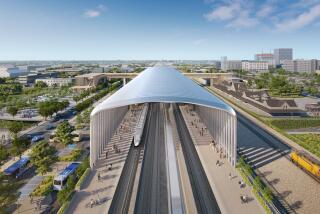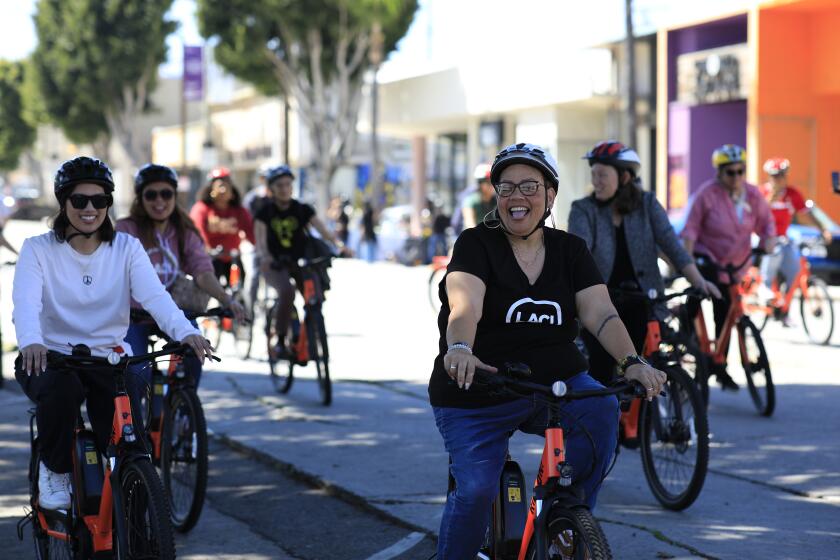Mass transit takes a hit in state budget
For a state with so many traffic problems, transportation ended up getting little respect when lawmakers forged a budget compromise in Sacramento.
The budget takes $1.3 billion of the sales tax on gasoline revenues away from local transportation agencies to balance the general fund budget.
The cuts could imperil a variety of transit projects, most notably the Exposition Line light rail from downtown L.A. to the Westside, extending the Orange Line busway from Warner Center to Chatsworth, and building the Gold Line from Pasadena to San Bernardino County, said Roger Snoble, chief executive of the Metropolitan Transportation Authority.
“As far as improving transportation here, it’s really a big setback,” Snoble said.
If the trend continues, he warned, the MTA would be hard-pressed to fund needed road projects, such as widening the 5 Freeway through the San Fernando Valley and near the Orange County line and the 10 through the eastern San Gabriel Valley, and completing the 710 through South Pasadena.
“Expect to spend more time on freeways. And expect to have less transit available,” Snoble said.
This is not the first time transportation has lost out in Sacramento.
In the last six years, the governor and state lawmakers have tapped the per-gallon gas tax and the separate sales tax on gasoline to balance the budget. These cuts are obvious to anyone who drives or takes mass transit. For many years, congestion has been growing much faster than road construction.
Transportation officials thought fortunes were turning when voters in November approved infrastructure bonds totaling nearly $20 billion over the next 30 years, which was touted as a way to ease the state’s traffic woes.
It was only a fraction of the estimated $200 billion of need across California, said James Ghielmetti, chairman of the California Transportation Commission. But it was a start.
Now some local transportation officials accuse state lawmakers of a “shell game” -- using the bond money to backfill cuts faced by transit agencies that had been expecting the revenues from the sales tax on gasoline.
People “voted for Proposition 1B expecting to have additional projects to improve our transportation system,” Snoble said. “That’s literally being stolen and used to balance the state budget.”
“Essentially, we all got hoodwinked,” Snoble added.
The budget uses $1.3 billion from the sales tax on gasoline to pay for spending that is loosely related to transportation. More than $1 billion will be spent to pay off bonds for rail projects that have been built or to repay the state highway program. The remainder will go to help school districts run school buses and to transport the developmentally disabled.
Gov. Arnold Schwarzenegger’s deputy finance director, H.D. Palmer, defended the approach. “These are clearly expenditures that are related to public transportation.”
And he noted that funding to operate mass transit systems and build transit projects will increase this year, thanks to the infusion of $700 million from the transportation bonds approved by the voters last fall.
But Assembly Speaker Fabian Nuñez (D-Los Angeles) said Democrats had to compromise with Republican lawmakers in order to win passage of the budget. One compromise was on mass transit funding, Nuñez said in Sacramento.
In tight budget years, Govs. Gray Davis, a Democrat, and Schwarzenegger, a Republican, have looked to transportation taxes as one way to help close the gap in the state’s general fund, which pays for such things as K-12 education, colleges and universities, prisons and health and welfare programs.
But voters in November, in addition to approving the transportation bonds, passed another measure to stop the state from balancing the budget with transportation funds.
So Schwarzenegger and lawmakers switched tactics this year, took money from the sales tax on gasoline and spent it on other programs instead of mass transit.
Other officials worried openly about what this means for public transit in coming years.
“The bond measure was clearly seen as a message from the electorate that they wanted to see transportation improvements,” said Brian Taylor, head of the Institute of Transportation Studies at UCLA. But faced with potential cuts to prisons, healthcare and schools, taking the budget knife to road programs can often seem the least harmful, at least in the short term, he said.
“For example, if you’re planning on widening a freeway . . . [but] you don’t fund it this year,” Taylor said, the freeway will still function, “albeit more slowly.”
Already hurting for cash, the MTA imposed a significant bus and rail fare hike in July. And just last week, the MTA predicted there would be just $4 billion in additional projected revenue for new projects through 2030, despite a need for roughly $30 billion. Two of the biggest projects include the $5-billion subway extension beneath Wilshire Boulevard to Santa Monica, and completing the 710 Freeway through South Pasadena for $2.5 billion.
Now, MTA officials are concerned they will not receive $314 million they had been counting on to build the Expo Line to Culver City.
Without the state funds, officials would have to use bond money or divert funds from other projects.
Or if money just runs out, Snoble said, “We could end up not getting to Culver City.”
Snoble said bus and rail service could be cut during nights and weekends, as well as on some of the more unpopular bus routes. But he added he was reluctant to look at increasing fares more than what is scheduled, at least in the short term.
New service cuts and bus fare hikes could be more immediate for Foothill Transit, which provides bus service in the eastern San Gabriel Valley. Officials are expecting a loss of $5 million to $10 million, said Paula Lantz, president of the Foothill Transit executive board.
“Obviously, this is going to hurt customers all over Southern California,” Lantz said, but particularly “those least able to afford it.”
Faced with a $60-million cut, the Orange County Transportation Authority expects delays on multiple freeway projects, including work on redesigning and widening several onramps and offramps on the 5 Freeway in Irvine and San Juan Capistrano, work on widening the congested 91 Freeway near the Riverside County line, and expanding parking at Metrolink commuter rail stations in Fullerton and Tustin.
“If we don’t invest in roads and transit, then congestion is going to become increasingly worse,” said Art Leahy, chief executive of the Orange County Transportation Authority. “And that’s going to reduce the economic vitality. . . and quality of life in Southern California.”
Transportation Commission Chairman Ghielmetti warned of dire consequences if state lawmakers continue to siphon money from projects. Ghielmetti has said the state has taken its transportation system for granted.
“We’re not raising enough money either through the federal government or the state to adequately maintain our bridges and our roads,” he said, referring to the Aug. 1 Minnesota bridge disaster.
Caltrans has identified 228 bridges that should be at the top of a list for repairs although they pose no danger for collapse. U.S. Sen. Barbara Boxer (D-California) and Nuñez last week said that the state’s bridges may not have been given the thorough and frank appraisal or repairs needed.
“In the long run, transportation is terribly underfunded,” Ghielmetti said.
jeff.rabin@latimes.com
Times staff writer Patrick McGreevy contributed to this report.
--
(BEGIN TEXT OF INFOBOX)
Running on empty
Local transportation officials warn that state budget cuts could threaten a number of transit and road projects:
The Exposition light rail line from downtown L.A. to the Westside.
Orange Line busway extension in the San Fernando Valley from Warner Center to Chatsworth.
Widening portions of the congested 91 Freeway near the Orange County-Riverside County line.
Improving onramps and offramps on the 5 Freeway in Irvine and San Juan Capistrano.
Expanding Metrolink commuter rail parking in Tustin and Fullerton.
Source: MTA, OCTA
Los Angeles Times
More to Read
Start your day right
Sign up for Essential California for news, features and recommendations from the L.A. Times and beyond in your inbox six days a week.
You may occasionally receive promotional content from the Los Angeles Times.






